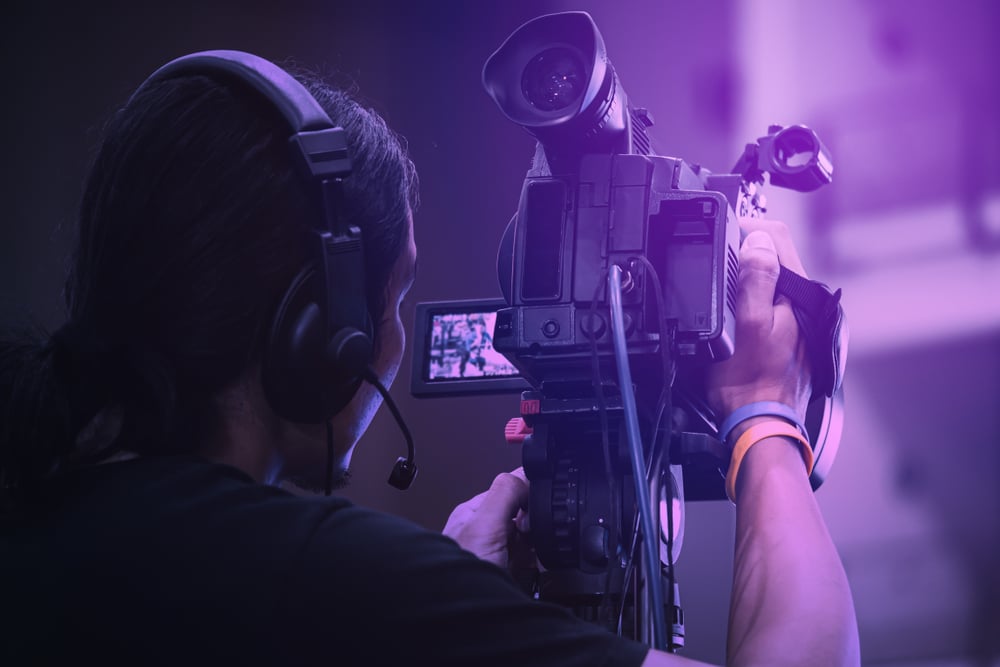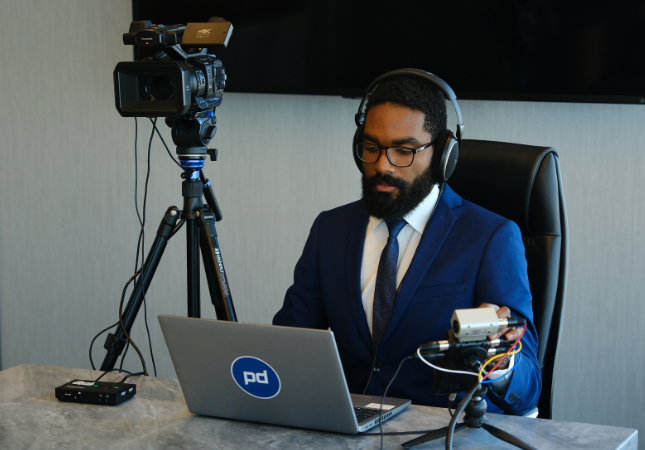The Importance of Legal Video Depositions in Modern Legal Services: What You Need to Know
Legal video depositions have ended up being crucial in today's lawful landscape. They supply a multidimensional view of witness testaments that typical transcripts simply can not match. By capturing both spoken and non-verbal interaction, these depositions boost the general understanding of a witness's credibility. However, the effectiveness of video clip depositions hinges on different elements, consisting of conformity with lawful requirements and ideal techniques (legal video depositions). Exploring these components reveals their true value in modern-day legal services
What Are Lawful Video Clip Depositions?
Lawful video depositions serve as a crucial device in the litigation procedure. They include recording witness testaments in a video clip layout, catching both non-verbal and verbal interaction. This approach enables lawyers to document the behavior, expressions, and responses of witnesses, giving a richer context for the testament. Commonly carried out in a regulated atmosphere, these depositions are led by lawyers who ask inquiries while a court press reporter documents the dialogue. The resulting video clip can be vital for test prep work, as it makes it possible for legal representatives to evaluate the reputation of witnesses and improve their methods. Additionally, legal video depositions can be utilized in different legal contexts, varying from civil conflicts to criminal cases. The visual and auditory elements of video clip depositions boost the presentation of proof, making it an important element in the modern-day legal landscape. Generally, they add considerably to the performance and efficiency of legal procedures.

Benefits of Video Depositions Over Traditional Approaches
Video depositions provide numerous advantages contrasted to typical techniques of taking witness testimonies. One considerable benefit is the capacity to capture both audio and visual components, offering a much more detailed document of the witness's declarations. This double format enhances clearness and permits lawyers to reference details nuances during test preparation. In addition, video clip depositions assist in remote involvement, making it less complicated for witnesses who may be unavailable for in-person appearances as a result of geographical restraints or wellness issues.Moreover, video clip depositions can accelerate the total deposition procedure, reducing the moment and expenses linked with travel and logistics. They also improve ease of access, as taped depositions can be conveniently shared among lawful teams and referenced at any moment. This comfort contributes to better case management and preparation. On the whole, video depositions represent a modern-day, effective technique to collecting witness testaments, aligning with the advancing requirements of the lawful career.
The Duty of Body Movement and Tone in Testimonies

In legal video depositions, body movement and tone play vital roles in communicating a witness's reliability and credibility. Nonverbal hints can offer insights right into a witness's mood, influencing just how their statement is perceived. Recognizing the influence of these elements is necessary for jurors and attorneys alike when assessing the dependability of a statement.
Nonverbal Communication Insights
While verbal communication is usually stressed in lawful testaments, nonverbal signs such as body movement and tone play a vital duty in communicating integrity and feeling. Onlookers of depositions might note that a witness's position, gestures, and facial expressions can significantly influence assumptions of dependability. For example, consistent eye call may signify self-confidence, while staying clear of gaze could recommend deceit or discomfort. The tone of voice-- its pitch, speed, and volume-- can impart sensations of genuineness or unpredictability. Attorneys should be in harmony with these nonverbal signals, as they commonly offer critical context that enhances spoken words. Comprehending these subtleties can boost the performance of depositions and influence the result of lawful proceedings.
Emotional Tone Influence
The psychological tone conveyed during lawful testimonies greatly affects exactly how a witness is viewed. Body language, singing inflections, and faces play crucial duties fit the story of a testament. A witness showing confidence via steady eye get in touch with and a calm tone can infuse a sense of reliability and involvement. On the other hand, signs of anxiety, such as fidgeting or an unsteady voice, might bring about hesitation concerning their account. The subtleties of emotional expression can influence the analysis of truths, making it important for lawyers to acknowledge these signs. In video depositions, the visual and acoustic parts combine, highlighting the value of emotional tone in conveying sincerity and truthfulness within the lawful procedure.
Credibility and Credibility
A crucial consider developing integrity and dependability during testimonies exists in the witness's body movement and tone of voice. Observers usually rely upon non-verbal hints-- such as eye contact, pose, and gestures-- to evaluate a witness's sincerity. For instance, a witness who maintains eye get in touch with and presents open body movement might be regarded as even more trustworthy and truthful than one who prevents eye call or shows up shut off. In addition, intonation plays an important duty; a steady, calm tone can enhance the credibility of the testimony, while changes in pitch or volume may raise doubts. Eventually, the mix of body language and vocal tone substantially influences how a witness's declarations are obtained and translated in a legal context.
Best Practices for Conducting Video Depositions
Carrying out video depositions calls for mindful preparation and implementation to ensure a clear and reliable presentation of testimony. Initially, it is essential to choose a quiet, well-lit area to decrease disturbances and safe and secure optimal video clip top quality. The equipment ought to be evaluated beforehand, including video cameras, microphones, and lights, to avoid technical problems throughout the deposition.Next, events involved should examine the format and procedures beforehand, ensuring that everyone recognizes their duties. The deponent needs to be informed on the process, consisting of how to respond clearly and concisely.Additionally, maintaining a specialist disposition throughout the session is crucial. This includes avoiding speaking over each other and validating that all questions are guided suitably. It is crucial to tape-record the deposition in a layout that allows for simple playback and testimonial, preserving the honesty of the testament for future use.
Lawful Factors To Consider and Compliance Issues
Exactly how do lawful considerations and compliance problems influence the performance of video depositions? Lawyers need to navigate an intricate landscape of policies, making certain that video depositions abide by administrative policies and standards. Compliance with regulations worrying personal privacy, authorization, and videotaping methods is important. For circumstances, acquiring explicit consent from all celebrations involved is required to prevent lawful repercussions.Additionally, the admissibility of video evidence in court can pivot on conformity with step-by-step demands. Making sure that the devices utilized satisfies technological criteria is additionally vital, as inadequate high quality can undermine the deposition's reliability.Moreover, lawyers have to recognize any kind of certain state laws that regulate video depositions, as these can vary considerably. Failure to deal with these considerations can not only jeopardize the honesty of the deposition however also impact the general situation strategy, eventually affecting the client's legal end results.
How Video Depositions Effect Jury Understanding
While video clip depositions can function as effective tools in legal procedures, their impact on jury perception is considerable. The acoustic and aesthetic components of video recordings provide jurors with an extra thorough understanding of witness attitude, reliability, and emotional reactions. This multimedia strategy can improve the jurors' capability to examine the reliability of testament compared to conventional text-based transcripts.Moreover, video clip depositions permit jurors to observe body movement, intonation, and faces, every one of which can affect their interpretation of the witness's declarations. The visibility of a witness on display can humanize them, cultivating compassion and link, which might guide jurors' opinions. Alternatively, a witness who appears undependable or evasive on video clip may bring about adverse perceptions that influence a jury's decision. Inevitably, the vibrant nature of video clip depositions plays a crucial function in shaping how jurors interpret proof and reach their verdicts.
The Future of Video Depositions in Legal Technique
As improvements in technology remain to improve the legal landscape, the future of video clip depositions learn this here now is positioned for significant evolution. Developments such as expert system, digital reality, and improved video conferencing tools are expected to simplify the deposition process and boost availability. Legal professionals may utilize AI-driven analytics to evaluate witness trustworthiness and case stamina more effectively.Moreover, the assimilation of digital fact could permit juries to experience immersive simulations of depositions, providing much deeper context and understanding. Furthermore, the pattern toward remote depositions is most likely to continue, offering higher versatility for customers and attorneys alike.As remote work becomes progressively normalized, video depositions will likely come to be common practice, decreasing costs and time restrictions linked with typical techniques. Generally, these technological improvements promise to improve the effectiveness, effectiveness, and ease of access of video clip depositions in legal practice, ultimately changing just how lawful specialists get ready for trial.
Regularly Asked Concerns
How Much Do Lawful Video Clip Depositions Usually Cost?

Can Video Depositions Be Utilized in Any Sort Of Case?
Video clip depositions can be used in numerous sorts of cases, consisting of civil, criminal, and family members law. Their adaptability enables lawyers to present witness testimonies effectively, adjusting to the certain needs of various lawful scenarios.
What Devices Is Needed for a Video Clip Deposition?
To carry out a video clip deposition, essential equipment consists of a premium camera, microphone, lights, and a reputable recording device. Furthermore, a computer with editing and enhancing software application might be needed for post-production and formatting the final video clip.
For how long Does a Normal Video Deposition Last?
A normal video clip deposition lasts in between two to 4 hours, relying on the complexity of the case and the variety of inquiries postured. Extended sessions might take place, but breaks are normally integrated for participant convenience.

Are Video Depositions Admissible in Court?
Video depositions are normally admissible in court, supplied they comply with lawful requirements and rules of proof. Their use boosts clearness and preserves witness statement, assisting in the judicial process throughout trials and hearings. Legal video clip depositions have actually ended up being crucial in today's lawful landscape. In addition, legal video clip depositions can be utilized in numerous lawful contexts, varying from civil disputes to criminal situations. Furthermore, video clip depositions promote remote involvement, making it simpler for witnesses who might be not available for in-person looks due to geographical restraints or health issues.Moreover, video clip depositions can accelerate the general deposition procedure, lowering the time and costs linked with traveling and logistics. Ensuring that the tools made use of fulfills technological standards is likewise vital, as poor high quality can undermine the deposition's reliability.Moreover, lawyers have to be aware of any kind of specific state laws that govern video depositions, as these can have a peek here vary considerably. Additionally, the look at this website fad toward remote depositions is likely to persist, offering greater adaptability for clients and lawyers alike.As remote job becomes increasingly stabilized, video depositions will likely come to be conventional method, decreasing prices and time restraints linked with standard approaches.